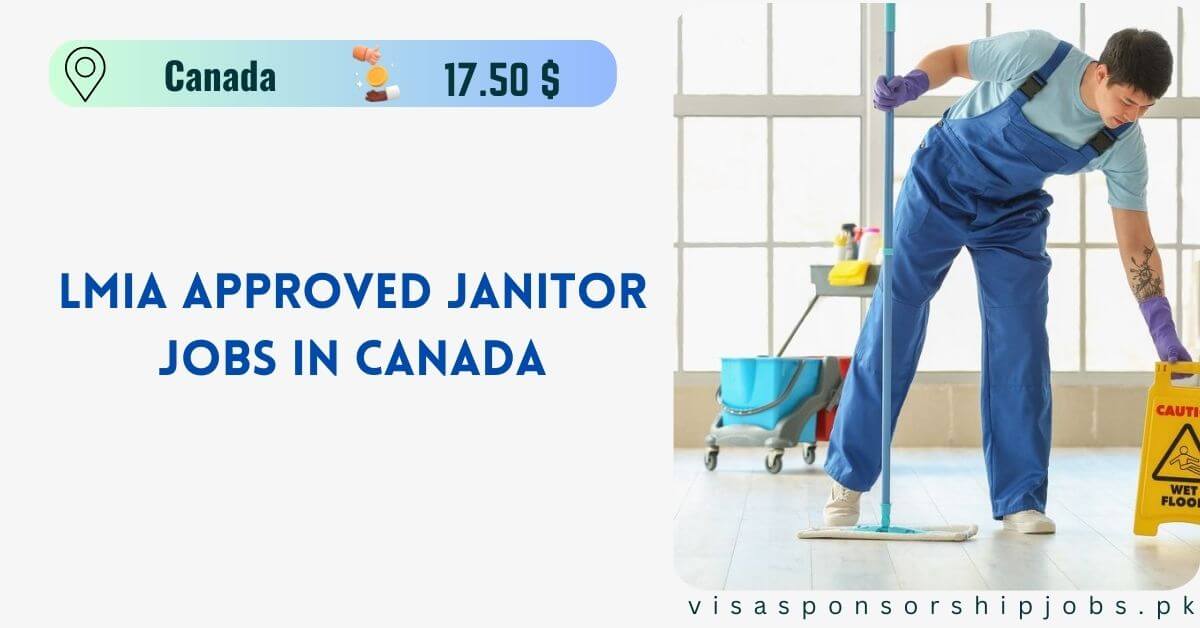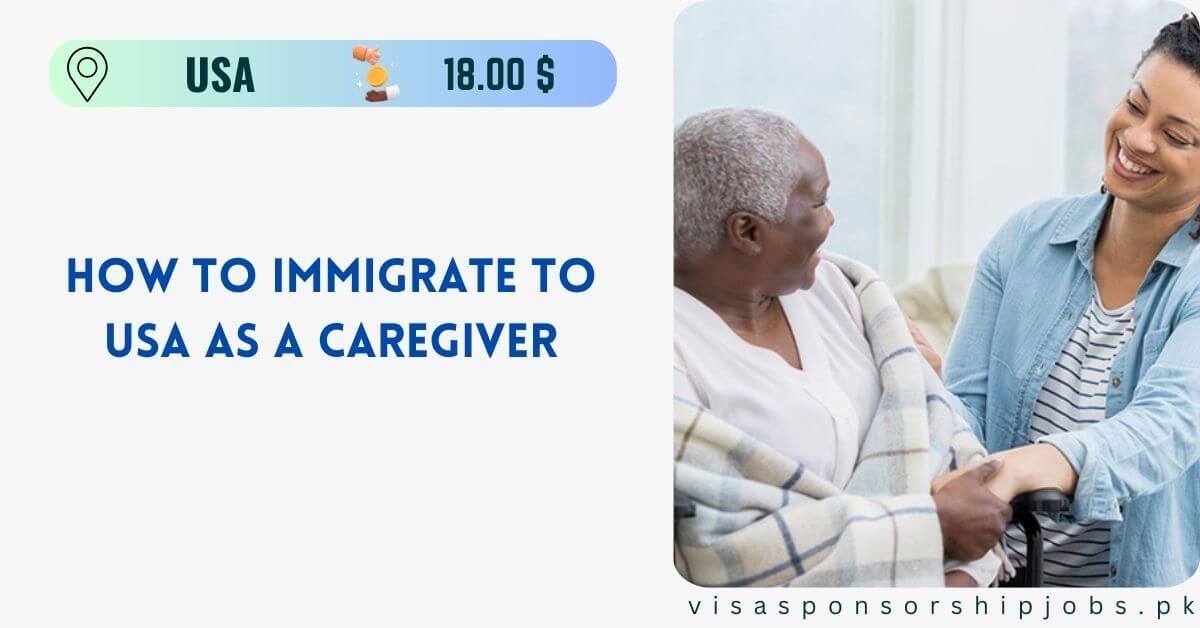LMIA Approved Janitor Jobs in Canada 2025 – Apply Now
In 2025, numerous janitor positions in Canada offer Labour Market Impact Assessment (LMIA) approval, enabling employers to hire foreign workers. These opportunities span various provinces, including British Columbia, Alberta, Ontario, and Quebec.
Check Also: Visa Sponsorship Jobs in Canada with lmia – Apply Now
About LMIA-Approved Janitor Jobs in Canada:
Kular Management Services, based in Abbotsford, Canada, is currently looking for custodians to work in both commercial and residential properties in the surrounding areas. The company offers positions with visa sponsorship, competitive salaries, travel reimbursement, and other attractive benefits. These positions are especially valuable for individuals seeking employment in Canada with the support of LMIA (Labor Market Impact Assessment) approval, which facilitates obtaining a Canadian work permit.
Key Details:
- Job Country: Canada
- Industry: Labor (Cleaning)
- Position: Janitor
- Minimum Experience: No formal experience required
- Education Requirements: Basic English proficiency (Canadian Language Benchmark IV or IELTS 4)
- Visa Sponsorship: Yes (with LMIA approval)
- Relocation Assistance: Yes (Reimbursement for travel expenses or access to public transportation)
- Accommodation: Not provided
- Employment Term: Temporary, Full-Time, Part-Time
- Salary Range: $30,225 to $44,457 annually (based on experience and location)
Job Duties:
Janitors in Canada are tasked with a variety of responsibilities that help maintain a clean, organized, and safe environment. The main duties of a janitor typically include:
- Cleaning and Sanitation: Sweeping, mopping, scrubbing, and dusting floors, walls, and windows. Cleaning and sanitizing bathrooms, kitchens, and other communal areas to prevent the spread of illness.
- Waste Management: Emptying trash bins, segregating recyclable materials, and disposing of waste according to environmental and safety standards.
- General Maintenance: Performing minor repairs such as changing light bulbs, fixing locks, and other basic maintenance tasks to ensure the facility’s smooth operation.
- Safety and Security: Ensuring that the building is secure and reporting any safety hazards, such as wet floors or faulty electrical equipment, to supervisors.
- Inventory Management: Monitoring cleaning supplies and ordering new stock as necessary to maintain cleanliness standards.
Janitors are often employed in various sectors, including office buildings, hotels, schools, hospitals, and industrial settings, each requiring different specific duties.
Benefits of LMIA-Approved Janitor Jobs in Canada:
Working as a janitor in Canada offers several benefits, especially for those coming from overseas:
- Legal Work Permit: The LMIA-approved position is an essential first step in obtaining a legal work permit in Canada. Once your work permit is issued, you will be legally authorized to work in Canada for a specified period.
- Competitive Salary: Janitors in Canada earn a competitive salary compared to other countries, often due to the higher cost of living. Salaries typically range from $30,225 to $44,457 annually, with additional benefits such as overtime pay available depending on the employer.
- Health and Dental Benefits: Many employers provide healthcare benefits, which may include medical, dental, and vision coverage for employees and their families. This is a significant advantage as it helps cover the costs of healthcare, which is a major concern for many foreign workers.
- Accommodation Assistance: While accommodation is generally not provided, some employers offer accommodation assistance or allowances to help with housing costs, especially in higher-cost living areas like Vancouver or Toronto.
- Paid Leave: Most employers in Canada offer paid vacation, statutory holidays, and sick leave. This ensures a better work-life balance for janitors, promoting both personal and professional well-being.
- Job Stability: Positions that are LMIA-approved are in high demand due to the steady need for cleaning services in both commercial and residential settings. As a result, employees benefit from greater job security, especially in urban areas with a constant flow of visitors.
- Career Advancement: While janitor positions are often entry-level, they can serve as stepping stones to more advanced roles in facilities management, maintenance supervision, or property management. Many companies offer training and promotion opportunities to those looking to advance their careers.
- Pathway to Permanent Residency: Holding an LMIA-approved job may be the first step toward applying for permanent residency in Canada. Many workers who obtain a work permit under LMIA approval later transition to permanent residency through the Express Entry program or other immigration pathways.
- High Quality of Life: Canada offers one of the highest qualities of life globally, including excellent healthcare, education, and public services. The country is known for its progressive policies, multicultural society, and exceptional natural beauty.
Eligibility Criteria:
The janitor positions in Canada are available to individuals from various countries, including Asian, African, and Latin American nations. Here are the general eligibility requirements:
- Age: There are no age restrictions for applying.
- English Proficiency: Applicants must demonstrate a basic level of English proficiency. This is typically proven through a Canadian Language Benchmark (CLB) score of 4 or higher, or by obtaining a minimum score of 4 on the IELTS exam.
- Experience: Previous janitorial experience is not required. However, it is advantageous to have prior work experience in cleaning or maintenance roles, especially in commercial or residential environments.
- Nationality: The positions are open to applicants from countries such as Pakistan, India, Bangladesh, Mexico, Jamaica, and many other nations from Asia, Africa, and Latin America.
Application Process:
The application process for LMIA-approved janitor jobs in Canada involves the following steps:
- Step 1: Prepare Your CV: Tailor your CV to highlight your skills, any relevant work experience (even if it’s informal), and your proficiency in English.
- Step 2: Email Your CV: Send your CV to the designated employer email address, Be sure to include a professional cover letter explaining why you’re interested in working in Canada and how your experience matches the job requirements.
- Step 3: Wait for Response: After submitting your CV, the employer will review your qualifications and contact you for further steps. They may conduct an interview (virtually or in person) to determine if you’re a good fit for the role.
- Step 4: Work Permit Approval: If you’re selected for the position, the employer will initiate the LMIA process to secure approval for your work permit. After the LMIA is approved, you will apply for a Canadian work visa.
- Step 5: Arrive and Work: Once your visa is approved, you will be able to travel to Canada, begin working, and start contributing to the local workforce.
Frequently Asked Questions:
How much is a janitor paid in Canada?
The average janitor salary in Canada is $35,425 per year or $18.17 per hour. Entry-level positions start at $30,225 per year, while most experienced workers make up to $44,457 per year.
How do I become a janitor in Canada?
Most janitors don’t need a formal education. At most, employers may request a high school diploma. If you’re new to the industry, your supervisor provides on-the-job training on cleaning, repairing, and using the equipment.
Is it easy to get a job as a janitor?
The qualifications to become a janitor are minimal. Many janitors have a high school diploma or GED certificate, but not all janitorial positions require it. To obtain a janitor position, you should know how to clean a variety of surfaces, though many companies provide on-the-job training.









